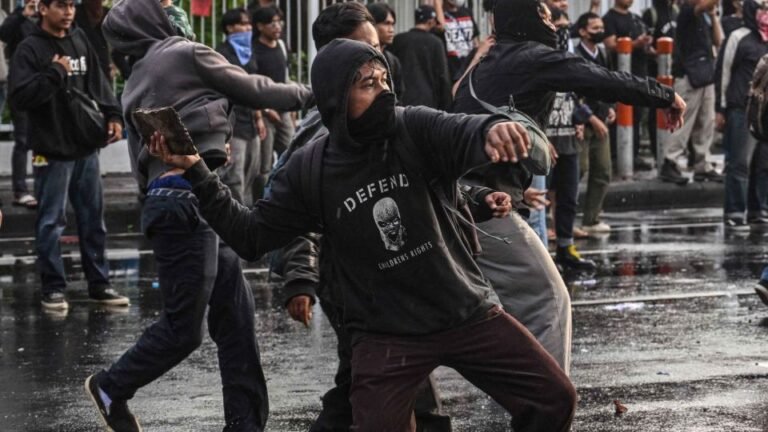
March 22, Jakarta: Indonesia is facing widespread public backlash and protests following the passage of controversial amendments to the country’s military law. The revised legislation, approved unanimously by the Indonesian parliament on Thursday, grants the military an expanded role in civilian governance, raising fears of a return to the authoritarian practices of the past. Critics argue that the changes undermine democratic reforms and risk reviving the military’s once-dominant influence over civilian life.
What Does the New Law Entail?
The amendments to the 2004 Armed Forces Law introduce several significant changes:
- Military Officers in Civilian Roles: Serving military personnel can now be appointed to key civilian positions within government ministries, a move that blurs the line between military and civilian governance.
- Extended Retirement Age: The retirement age for four-star generals has been raised from 60 to 63 years, while non-commissioned officers can now serve until they are 55.
- Presidential Authority: The law grants the president the power to assign military personnel to various ministries as needed, further centralizing control.
The revisions were spearheaded by the coalition government of Prabowo Subianto, a former army general and son-in-law of the late dictator Suharto. Subianto, who has long been a polarizing figure in Indonesian politics, has defended the changes as necessary for national security and modernization.
Why the Outrage?
The amendments have sparked fierce criticism from pro-democracy activists, human rights groups, and analysts, who see the move as a dangerous regression to the authoritarian era of Suharto’s rule. During his 32-year dictatorship, the military held a “dual function,” playing a central role in both defense and governance. This period was marked by widespread human rights abuses, suppression of dissent, and rigged elections.
Activists fear that the new law could restore the military’s dominance over civilian affairs, eroding the democratic reforms achieved since Suharto’s fall in 1998. “The move has the potential to restore the authoritarian system,” said Al Araf, director of the rights group Impartial. “It is inconsistent with the spirit of the reforms that returned the military to the barracks.”
The lack of transparency in the legislative process has further fueled public anger. The amendments were drafted and discussed behind closed doors, with minimal public input. Pro-democracy activists discovered that lawmakers and government officials held secret meetings at a five-star hotel in South Jakarta to finalize the revisions.
Protests and Public Backlash
In response to the new law, violent protests erupted in Jakarta, with demonstrators breaking through the fence of the House of Representatives building. Police used water cannons to disperse the crowds, but the unrest underscored the depth of public opposition to the amendments.
Human rights groups have condemned the changes, warning that they could lead to power abuse and weaken democracy. Andreas Harsono, a senior Indonesian researcher at Human Rights Watch, criticized the government’s haste in passing the law, stating, “President Prabowo appears intent on restoring the Indonesian military’s role in civilian affairs, which were long characterized by widespread abuses and impunity.”
The Indonesian Association of Families of the Disappeared (KontraS), which advocates for victims of state violence during the Suharto era, warned that the revisions “open the door to power abuse” and undermine accountability.
Government’s Defense
Defense Minister Sjafrie Sjamsoeddin defended the amendments, arguing that they are necessary to address evolving geopolitical challenges and modernize the military. “Geopolitical changes and global military technology require the military to transform to face conventional and nonconventional conflicts,” he said. “We will never disappoint the Indonesian people in maintaining the sovereignty of the Unitary State of the Republic of Indonesia.”
However, critics like Laksmana, an analyst at the International Institute for Strategic Studies, argue that the revisions fail to address critical issues such as resource allocation, training, and hardware standardization within the military.
A Troubled History
The controversy surrounding the new law is deeply rooted in Indonesia’s history. In 1965, following a failed coup attempt, General Suharto led a violent purge that killed an estimated 500,000 to one million people, mostly accused communists and leftists. This event paved the way for his authoritarian rule, known as the New Order, during which the military played a central role in suppressing opposition and maintaining control.
The military’s “dual function” during this period allowed it to dominate both defense and governance, creating a system marked by repression and impunity. The recent amendments have reignited fears of a return to this dark chapter in Indonesia’s history.
The passage of Indonesia’s new military law has sparked widespread outrage and protests, with critics warning that it represents a dangerous step backward for the country’s democracy. By expanding the military’s role in civilian governance, the amendments risk reviving the authoritarian practices of the Suharto era and undermining decades of democratic progress.
As Indonesia grapples with this contentious issue, the focus must remain on safeguarding democratic principles, ensuring transparency, and protecting human rights. The public outcry against the law serves as a powerful reminder of the importance of vigilance in defending democracy against the encroachment of authoritarianism.
Get more News Headlines On Our Social Platforms And Do Follow.




